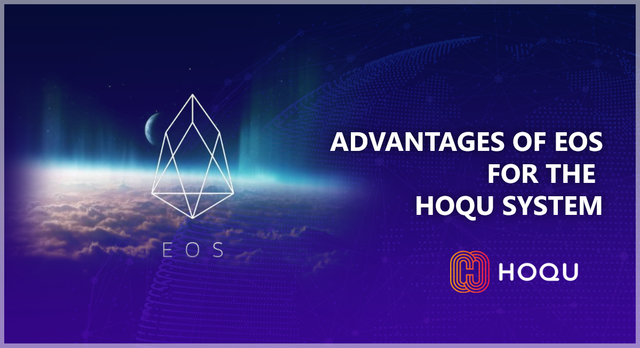The Advantages Of Using EOS For The HOQU Ecosystem

As you all know, the performance and cost-effectiveness of the HOQU platform depends directly on the blockchain platform it is based on.
The commission charged by the HOQU platform that uses smart contracts is only 0.5% per transaction, as described in the White Paper. Therefore, the cost of the transaction is one of the most important criteria that will shape the feasibility of the platform from an economic point of view.
It is for this reason that the HOQU team has begun searching for alternative blockchain platforms with transaction fees that are minimal or simply absent.
One of the options we have chosen is EOS. And now, we would like to introduce you to the advantages of the EOS blockchain that have interested us:
The absence of fees for actions. EOS will use an ownership model under which the ownership of EOS tokens gives users a proportional share of network bandwidth, storage and computing power. This means that if someone owns 1% of EOS tokens, they will always have access to 1% of the network bandwidth, regardless of the load on the rest of the network. In addition, since the network will have zero transaction fees, the cost of developing applications will be zero, except for the initial purchase of EOS tokens. In addition, the tokens can always be sold to return the initial investments, if the holder wants to do so.
Transaction speeds. The creators of EOS claim that the execution of transactions will take no more than 1 second by means of refraining from those who have the right to verify transactions.
Graphene technology. EOS will rely on Graphene technology, which has demonstrated to have the ability of achieving from 10,000 to 100,000 transactions per second under stress tests. The implementation of this technology will allow for instantaneous transactions. In addition, the growth of transaction volumes in the network will not cause any problems with transaction speeds.
Built-in EOS mechanism. The EOS Blockchain provides advanced features for writing smart contracts, for example, using cryptographic and communication tools and other functions, which will allow for more flexible and functional smart contracts.
In summary, we have come to the conclusion that by using the EOS blockchain, we will be able to store and instantly perform transactions on the blockchain.
Our team is already writing ecosystem smart contracts for EOS, which will later be connected to the platform core, and will also be configured to integrate with the tracker we have created.
Respectfully,
The HOQU Team
Hi! I am a robot. I just upvoted you! I found similar content that readers might be interested in:
https://steemit.com/eos/@trogdor/eos-vs-ethereum-for-dummies
The flippening begins...